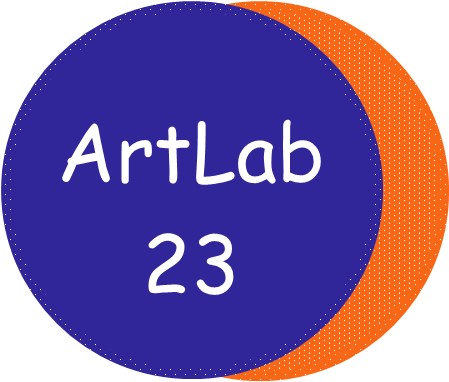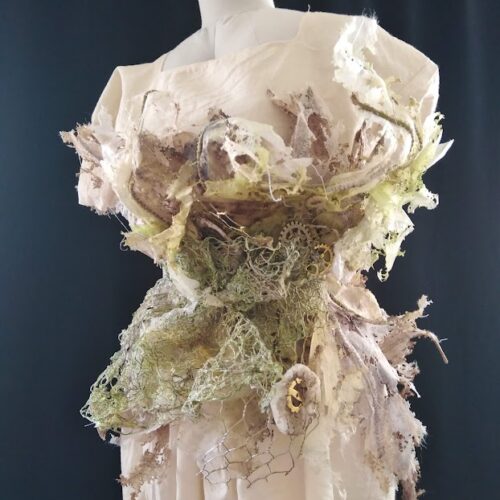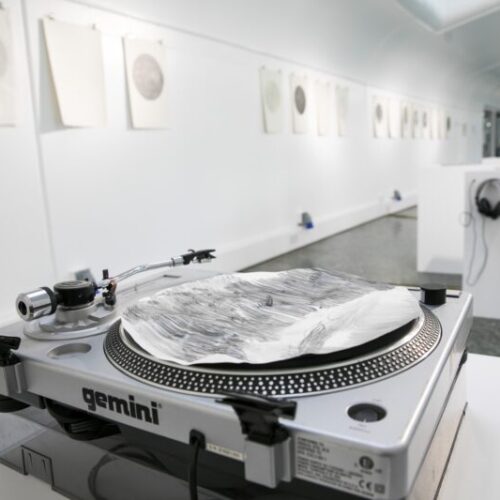
Happy Birthday Mondrian
This is a post from the weareoca.com archive. Information contained within it may now be out of date.
Thursday 7th March saw the opening of the Leeds College of Art second year BA Fine Art exhibition ‘Happy Birthday Mondrian’ at Mexico Project Space in Leeds. The title of the exhibition is a reference to the Dutch artist Piet Mondrian, famous for his grid-based paintings produced in the early to mid-1900’s, whose birthday happened to fall on the opening of the exhibition.
The exhibition as a whole dealt with a range of subjects from homelessness, consumerism, identity, the fragility of the human body and class consciousness, with a number of works causing me, the viewer, to consider of the sheer physicality of particular materials, including wood, sugar, paint and textiles.
What struck me most was the amount of notably accomplished painting in the exhibition. David Cleary’s ‘Arseholes’, the first works encountered when entering the gallery, combine humour and the vulnerability of the naked form in an ever-so-slightly sinister composition, reminiscent to my mind of the paintings of Francis Bacon.  Nancy Fagan’s ‘Life Cycle’ references organic forms using natural tones, while Tomas Rowell’s painting in the show appears to be a more direct exploration of how paint and surface work together, his use of calico as a base for his oil painting an unusual addition.
Nancy Fagan’s ‘Life Cycle’ references organic forms using natural tones, while Tomas Rowell’s painting in the show appears to be a more direct exploration of how paint and surface work together, his use of calico as a base for his oil painting an unusual addition.
A number of the pieces in the show explored social and cultural themes. Christina Hayes intriguing use of codes and text in her slate works induced me as the viewer to attempt to deconstruct the code and glean meaning from the text, leading me to consider whether communication of specific information is important in this work or whether referencing communication as a whole is the focus. 
Maxwell Harper’s ‘Wes’ is a poignant exploration of the relationship between those that are homeless and those that aren’t, encouraging the viewer to consider the power relationship that an exchange between someone who is standing to someone who is seated automatically instils. Sarah Louise Hawkins piece ‘Class No Longer Exists’ raises some interesting questions about class identity in the UK. Although the message within the piece is somewhat absolute, a dead-end statement of subjective experiences, what it opens up is a question of how class identity manifests itself in a capitalist society.  The work posits that where there was once pride and solidarity amongst the ‘working classes’, and the void that the decline in British industry has left in the North, a generation of directionless and disconnected individuals, or the ‘underclass’ as the work puts it, has taken its place. What I couldn’t help wonder however, was whether the same notions of pride and solidarity among a workforce can still be found. Do technicians, supermarket workers, factory workers, postmen and women feel a sense of pride and kinship to each other? It is certainly a provocative piece, I found myself thinking about it long after I had left the show.
The work posits that where there was once pride and solidarity amongst the ‘working classes’, and the void that the decline in British industry has left in the North, a generation of directionless and disconnected individuals, or the ‘underclass’ as the work puts it, has taken its place. What I couldn’t help wonder however, was whether the same notions of pride and solidarity among a workforce can still be found. Do technicians, supermarket workers, factory workers, postmen and women feel a sense of pride and kinship to each other? It is certainly a provocative piece, I found myself thinking about it long after I had left the show.
What I think the exhibition as a whole indicates is a welcome trend in fine art education for encouraging the artist to not only work introspectively, but also to consider themselves in terms of a wider social and cultural context, without steering them towards, or away from, a particular discipline.
Top image: Lydia Brockless Next:Nancy Fagan Next: Maxwell Harper Bottom image: Maja Leszczynska






It’s interesting to see artists tackling more social and political themes. It brings to mind Grayson Perry’s tapestries of working, middle and upper classes, the making of which was televised a year or so ago. It’s not an area often addressed in visual art.